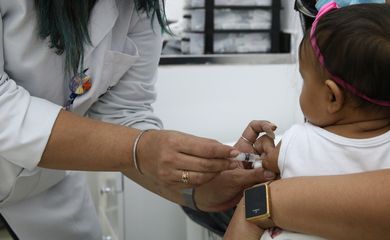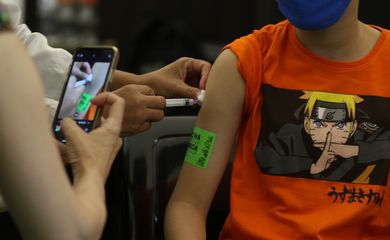Unicef: Polio vaccination coverage in Brazil sees improvement

In 2022, among the 2,561,922 children born alive in Brazil, 243,008 had not received the first dose of the vaccine against polio, also known as infantile paralysis. Last year, out of 2,423,597 newborns, 152,521 lacked the dose—a decrease of over 90,000 unvaccinated children. These statistics were presented on Tuesday (Apr. 23) by the United Nations Children's Fund (UNICEF) in Brasília.

Luciana Phebo, head of the Health Department at UNICEF Brazil, highlighted the declining vaccination coverage of key childhood immunizations since 2015, exacerbated by the COVID-19 pandemic. "After years of decline, Brazil has begun to regain momentum in vaccination," she stated during a press conference. "Over 90,000 children. That's the magnitude of the change. A significant shift," she emphasized.
Minister of Health, Nísia Trindade, described Brazil's current vaccination coverage as "a turning point." "We are at a pivotal moment—a shift towards attaining the necessary vaccination coverage to safeguard our children, our society, and our adolescents," she remarked. Trindade specifically highlighted the HPV vaccination, now administered in a single dose to children and adolescents aged 9 to 14, starting this year.
The minister highlighted that 13 out of the 16 primary childhood vaccines under the National Immunization Program (PNI) demonstrated increased vaccination coverage in 2023 compared to the previous year. The vaccines mentioned by the minister include polio, pentavalent, rotavirus, hepatitis A, yellow fever, meningococcal C (1st dose and booster), pneumococcal 10 (1st dose and booster), triple viral (1st and 2nd doses), and bacterial triple booster.
"It marks a turning point achieved through considerable effort. While we should celebrate, it's also essential to acknowledge the challenges that lie ahead," remarked Trindade. "This overall increase in coverage means significant progress, which we are celebrating. However, it's important to recognize that we still have a long journey ahead of us," she emphasized.
Amid World Immunization Week and Vaccination Week in the Americas, observed from April 24 to 30, Socorro Gross, the representative of the Pan American Health Organization (PAHO) in Brazil, underscored the significance of the polio vaccination schedule. Notably, in Brazil, the transition from the oral polio vaccine to the inactivated injectable version of the vaccine has commenced this year.
Gross emphasized that three key public health interventions, as identified by PAHO, are crucial for ensuring a high quality of life for all children: access to clean drinking water, breastfeeding, and vaccination. "The Americas region has faced significant challenges in recent years, resulting in a decline in vaccination coverage," she stated.





